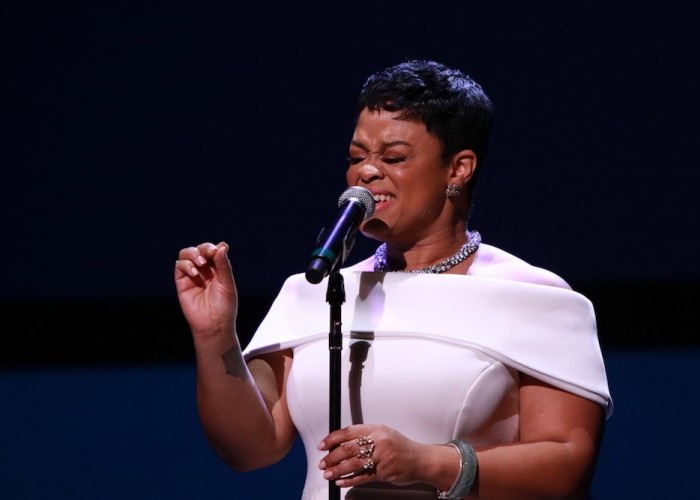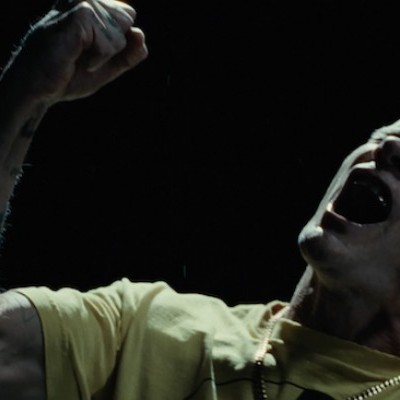Dec 9, 2025 12:28 PM
In Memoriam: Gordon Goodwin, 1954–2025
Gordon Goodwin, an award-winning saxophonist, pianist, bandleader, composer and arranger, died Dec. 8 in Los Angeles.…

Laurin Talese performs at the Sarah Vaughan International Jazz Vocal Competition on Nov. 18 at the New Jersey Performing Arts Center (NJPAC) in Newark.
(Photo: Anthony Alvarez)Laurin Talese has spent countless hours as a vocal teacher emphasizing the importance of breath control to students. On Nov. 18 she made the point emphatically as she captured first place in the 7th Annual Sarah Vaughan International Jazz Vocal Competition.
The classically trained Philadelphia-based singer synthesized strong vocal technique with musical passion to emerge on top in the competition finals at the New Jersey Performing Arts Center (NJPAC) in Newark. The competition is also known as the Sassy Awards, a nod to a nickname for singer Sarah Vaughan (1924–’90), a native of Newark.
Talese received a $5,000 cash prize and was guaranteed a performance slot at the 2019 Newport Jazz Festival.
On all three of her numbers at the finals, Talese was about as complete a performer and singer as you could ask for, thanks to a combination of natural talent and the commitment she has made to developing her vocal chops.
“It comes from years of being in love with the music and taking my time and taking the songs that I love and trying to do them better,” she told DownBeat in an interview.
Talese will appear at Jazz Standard in New York on Dec. 8, and she’ll return to the city for a show at the Birdland Theater on Feb. 5, 2019.
Her previous engagements include the Apollo Theater in Harlem, Philadelphia’s Academy of Music and the Kennedy Center for the Performing Arts in Washington, D.C.
With her victory at NJPAC, Talese joined the ranks of past winners, such as Cyrille Aimée (2012), Jazzmeia Horn (2013) and Arianna Neikrug (2015).
This year, second place went to Oleg Akkuratov, a pianist and vocalist who teaches at the Rostov State Conservatory in Russia. Only the second man ever to perform in the finals of the competition (following a rule change last year that allowed in male singers), Akkuratov received a $1,500 cash prize.
Toscha Comeaux, a native of Hartford, Connecticut, finished third and took home $500.
The other finalists were New Orleans-based Gabrielle Cavassa and Olivia Chindamo, an Australian who now calls New York home.
The singing competition—the final event of the TD James Moody Jazz Festival at NJPAC—was open to solo vocalists who were not signed to a major record label. More than 600 men and women globally submitted audio tracks online. Through three rounds of public voting, the field was narrowed to five candidates. The 173 eligible entrants represented 41 different countries.
The judges for the finals were Stefon Harris, NJPAC’s artistic advisor of jazz education and the winner of the Vibraphone category in the 2018 DownBeat Critics Poll; trumpeter Jon Faddis; vocalist-composer Nnenna Freelon; Mary Ann Topper, president of artist management company Jazz Tree Inc.; and Sheila E. Anderson, an on-air host with Newark public radio station WBGO.
Providing musical accompaniment for the singers was a trio led by pianist and musical director Sergio Salvatore, with Gregory Jones on bass and Buddy Williams on drums.
Under the contest format, each singer performed two songs and then returned to sing one more.
Talese filled her performances with a variety of subtle flourishes. On her opening first-round number, “The Very Thought Of You,” she brought an operatic splendor to the standard, her voice filled with a beautiful smoothness. When she shifted into medium-tempo mode on “Something Happens To Me,” a tune recorded by her idol, Nancy Wilson, she loosened up the rhythm while honoring the song’s emotional integrity.
Her lone second-round song was “Save Your Love For Me” (a ballad that Wilson once recorded with Cannonball Adderley). During this performance, the fruits of the hours Talese spent laying the groundwork for acrobatic vocal feats were evidenced by her graceful swoops.
The competition was notable for both the high level of skill and the diversity of vocal styles it showcased.
“This year’s class of singers are unique in their styles, but in their voices you can hear the history and respect for [the artists who] came before,” said NJPAC CEO John Schreiber, noting that the styles on display were an encouraging sign for jazz.
Comeaux—a singer whose hallmark is her power—kicked things off in the first round with “You Turned The Tables On Me” and a scat-sung medium-tempo blues based on Vaughan’s own “Sassy’s Blues.”
She was followed by Cavassa, who put a spare style and horn-like sound to good use on “Stardust” and “I’ve Never Been In Love Before.”
Then came Akkuratov—a blind musician who accompanied himself on piano—joined by Jones and Williams. Akkuratov performed a Latin-flavored version of “Nature Boy,” blending scatting, crooning and note-bending as he sang. He then downshifted into an intimate take of “Skylark.” Contest master of ceremonies and WGBO on-air host Rhonda Hamilton called “Skylark” an appropriate choice, because it was delivered on the 109th anniversary of the birth of Johnny Mercer, who penned the lyrics for the Hoagy Carmichael-composed melody.
After Talese performed her first two songs, Chindamo closed the first round by singing “Wrap Your Troubles In Dreams” and “Autumn In New York.”
Info on the five finalists is posted on the competition’s website. Additional info on Talese is posted on her website. DB

Goodwin was one of the most acclaimed, successful and influential jazz musicians of his generation.
Dec 9, 2025 12:28 PM
Gordon Goodwin, an award-winning saxophonist, pianist, bandleader, composer and arranger, died Dec. 8 in Los Angeles.…

Belá Fleck during an interview with Fredrika Whitfield on CNN.
Jan 13, 2026 2:09 PM
The fallout from the renaming of the John F. Kennedy Center for the Performing Arts to include President Donald…

The success of Oregon’s first album, 1971’s Music Of Another Present Era, allowed Towner to establish a solo career.
Jan 19, 2026 5:02 PM
Ralph Towner, a guitarist and composer who blended multiple genres, including jazz — and throughout them all remained…

Flea has returned to his first instrument — the trumpet — and assembled a dream band of jazz musicians to record a new album.
Dec 2, 2025 2:01 AM
After a nearly five-decade career as one of his generation’s defining rock bassists, Flea has returned to his first…

Rico’s Anti-Microbial Instrument Swab
Jan 19, 2026 2:48 PM
With this year’s NAMM Show right around the corner, we can look forward to plenty of new and innovative instruments…